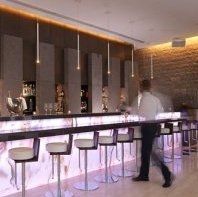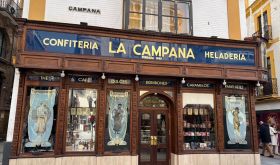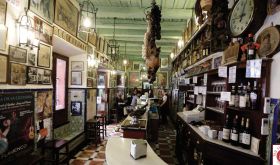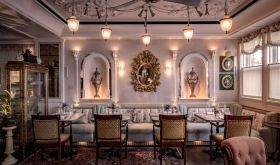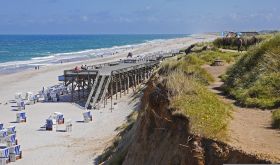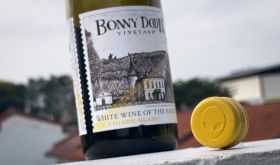No sooner had I sat down at L'Anima, the modern Italian restaurant near Liverpool Street station which opened six months ago to justifiable acclaim, than its owner, Peter Marano, asked me to leave. I hadn't misbehaved, but rather Marano wanted to put L'Anima into its physical context before we put his chef, Francesco Mazzei, to the culinary test.
What followed was a windy 10-minute tour as Marano showed me round the outside of the 500,000 sq ft office development that sits above L'Anima and explained, conceptually, why placing such an ambitious restaurant here was so crucial to his overall plans. 'There have been two separate phases to this development which I have been working on for the past 15 years. What L'Anima now does is act as the bridge between the two buildings and provide an impressive entrance to the whole site. It sets the tone', he said.
Marano, 50, is a tall, rangy Californian who first came to London in 1986 and has ridden the highs and lows of its property market ever since. In one respect he is not an unlikely restaurateur in that his genetic make-up is quintessentially hospitable – he is half Irish, a quarter Scot and a quarter Italian – but there are several aspects to L'Anima's subsequent success that even this optimistic American never foresaw.
'I knew that there was a market for an exciting, ambitious restaurant in this part of town because I had worked here for so long and I was fed up of having to take the tube to the West End to entertain my guests. If I felt like that, I was sure there would be many others who would', he explained.
This personal hunch was, however, backed up by facts that underpinned his determination to develop this site. Its proximity to a major railway hub, increasingly important as more people rely on public transport; the fact that 30,000 work within 200 metres of the restaurant earning pretty good salaries; and that these are spread across a wide range of professions despite the nearby City's reputed reliance on financial institutions. Marano did point out that there has been a noticeable increase in bookings from insolvency practitioners, and that they invariably book large tables.
But none of these factors prepared Marano or Mazzei for what has been the most surprising development since the restaurant opened, that it has been consistently busier in the evenings than at lunch. 'We are very close to Shoreditch, where there has been significant residential development over the past few years and it's become an area into which a lot of young professionals have moved. Happily, but this was definitely not part of my original business plan, they do like to come here in the evening', Marano confessed with a smile. As a result, the restaurant is now open and busy on Saturday evenings.
Marano's conviction that the site would be successful was not, however, reciprocated by the restaurateurs he initially approached as potential partners. After an introduction to Mazzei via Arnold Chan, the lighting consultant, they began to work together initially with Mazzei as a consultant (he was then the chef at St Alban in the West End) and then as a partner.
From a customers' perspective, this has been a happy marriage. The bright, white modern interior would not look out of place in any city centre in Italy and the small windows in the wall between the restaurant and the kitchen allow any interested diner a good view of not just what the chefs are preparing at the stoves but also when they are on their mobile phones.
Mazzei's cooking draws its inspiration from Naples and the large Campania region to the south. Inspired first courses have included a warm salad of octopus, cannelini beans and ricotta; red shrimps with a tuna, anchovy and caper dressing; and crab avocado and carasau, the addictive Sardinian flat bread. The heartiness of some of the main courses – Sicilian rabbit, a fish stew with couscous, and slow roasted pork belly – are balanced by a simpler range of grilled fish and meat. Desserts include Mazzei's search for the perfect soufflé and there is an excellent wine list, overseen by Gal Zohar, an enthusiastic Israeli sommelier.
While Marano's grander ambitions have financially underpinned all that Mazzei and his team now deliver, it has come at a considerable cost. Although only a small part of the overall investment, L'Anima has now cost £3.2 million and that figure excludes initial operating losses and the £500,000 incurred when a last-minute planning dispute delayed the opening by seven months. Marano has now secured permission to build a small, outdoor extension but, frustratingly for his team, this can only now be achieved by closing the restaurant for at least a month.
Over a particularly good dish of tagliatelle with a duck ragu, Marano recalled three specific points about his new career as a restaurateur. 'Firstly, I didn't think that I would have to work as hard as this. Secondly, I didn't appreciate how easy it is to make a mistake when you're dealing with the general public every day. And I certainly didn't appreciate quite how obsessive people have become about food. I had Mazzei's rendition of linguine with crab one night with several friends, one of whom mentioned it was cooked differently at another Italian restaurant in town. Within 24 hours I had emails from all of them detailing which one each preferred and why.'
At the end of the meal, Marano echoed a sentiment I have heard from everyone who has opened a restaurant in the last year: that if they had known about the current state of the economy they would certainly not have invested so much. Then he got personal and pointing to his stomach, said, 'The funniest thing is that before L'Anima opened as I was running around so much, I got thinner. Now as the chefs are working so hard, they seem to be getting thinner and I'm putting on weight.'
L'Anima, www.lanima.co.uk

